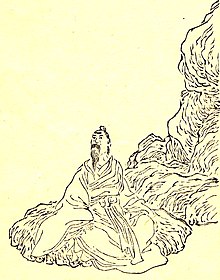- ↑ Yingming, Hong. "Xian Fo Qi Zong" 仙佛奇踪; The Sacred Traces of Taoist Immortals and Priests, Buddhas and Zen Masters. DeepLogic.
- ↑ "Netsuke: Zhang Liang and Huang Shigong". Hermit Age Museum.
- 1 2 Fang, Li. Taiping Guangji; A Collection of Ancient Novels in China; The Volume of Immortals and Fairies (Vol. 1–70): 太平广记之神仙女仙卷. DeepLogic.
- ↑ Shi, Li. The Military History in Qin and Han Dynasty. DeepLogic.
- 1 2 龙腾砚 (in Chinese). 南文博雅. 8 May 2015.
- ↑ (孺子可教矣!)
- ↑ 六十种曲评注 (in Chinese). 吉林人民出版社. 2001. ISBN 978-7-206-03888-4.
- ↑ 西遊記: Journey to the West (in Chinese (Taiwan)). Google Publishing. 25 October 2014.
- ↑ 越中瓢簞菴藏李卓吾先生批評西遊記 (in Chinese). 明清出版機構研究会. 2001.
- ↑ 吴承恩与《西游记》 (in Chinese). 东方出版中心. 2008. ISBN 978-7-80186-796-4.
- ↑ 西遊記: 一百囘 (in Chinese). 商務印書館. 1941.
- ↑ Dao, Zhi. Myths and Legends of Ancient China. DeepLogic.
- ↑ "'Viewing Zhangjiajie Scenery Online' Day 28: Huangshi Village". en.zjjw.com. 30 March 2020.
| Huang Shigong | |
|---|---|
 An illustration of Huang Shigong |
| International | |
|---|---|
| National | |
| Other | |